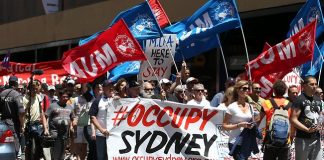Confusion about class and the class divide in society lies behind the argument among climate campaigners about who exactly should bear the burden of making the transition to a less carbon-intensive economy, argues Tom Barnes. “Make the polluters pay,” is a popular slogan.
But how do we make sure that those responsible for carbon pollutions really do pay?
In July, Geoff Lemon, a pro-climate Melbourne-based blogger, wrote that genuinely struggling working families:
“Will get compo anyway. But even they could afford it if they had to. Buy one less deck of Holiday 50s a week. Buy two less beers. Leave off the Foxtel subscription”. Whether it was intended or not, this argument from a climate sympathiser involves a dreadful caricature of working class people.
At the heart of the debate about who should pay is the widely-held view that individuals and households should pay their fair share of the transition as well as polluting companies.
It is true that individual actions have an impact on climate change. But individual choices are far less important than the economic decisions of large producers in a capitalist economy.
Large capitalist firms have enormous power to manipulate prices. Increased costs can be absorbed by some firms looking to drive out competition. For example, Coles and Woolworths have enough market control to be able to engage in periodic price wars.
Other firms can pass on higher costs as higher prices for consumers without suffering from a major drop in demand.
For instance, motoring bodies have criticised the big fuel companies for keeping petrol prices artificially high during the dollar’s recent appreciation.
BP, Shell, Caltex, etc, are able to do this because individuals don’t have any choice but to accept the bowser price.
And it’s clear that mining companies feel they can either absorb the extra cost of the carbon tax or pass it on to with no threat to their profits.
Australian Bureau of Agricultural and Resource Economics data for April revealed that mining companies are planning to invest a whopping $173.5 billion, with capital expenditure set to rise by 86 per cent in a single year.
Playing on class
Tragically, this is being used by climate deniers and opponents of radical action to stifle the debate, even though such figures would ordinarily have nothing to do with working class interests.
The “Australian Trade and Industry Alliance”—a collection of peak bodies representing large manufacturing firms, coal miners, steel producers, retailers, builders and the Chamber of Commerce—has run a $10 million campaign with TV ads that show workers asking the government, “Why threaten our jobs?”, families, hospital workers and farmers asking, “Why should our electricity bills nearly double?” and a pensioner asking, “Why should I have to pay more for groceries?”.
The ads are nauseating, but they rely on assumptions about class. We do not see images of mining magnates explaining, “Why we should keep our profits” or top CEOs trying to justify, “Why I should be paid millions”!
Under the carbon tax, any cost imposed on carbon-emitting firms will be passed down to smaller firms and, eventually, onto wage-earners. The unpopularity of the carbon tax suggests that most workers perceive this.
Tony Abbott and the big capitalists are exploiting this mood to prevent action on climate change.
Climate is a class issue. To argue that capitalist markets can fix climate change is to rely on a lop-sided economic world-view in which classes do not exist.
Worse still, to emphasise that the cost is small and that we can all pay—when it is clear that the burden is not evenly shared—will only strengthen the influence of capitalist ideas over workers while seriously damaging the prospects for radical climate action in Australia.





